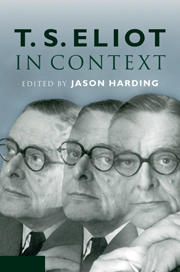Book contents
- Frontmatter
- Contents
- List of illustrations
- List of contributors
- Acknowledgements
- List of abbreviations
- Introduction
- PART ONE LIFE
- PART TWO FORMS
- PART THREE LITERARY CROSS-CURRENTS
- PART FOUR POLITICS, SOCIETY AND CULTURE
- 26 Politics
- 27 Economics
- 28 Anti-Semitism
- 29 Gender
- 30 Religion
- 31 Philosophy
- 32 Social science
- 33 Natural science
- PART FIVE RECEPTION
- Further reading
- Index
33 - Natural science
Published online by Cambridge University Press: 05 August 2012
- Frontmatter
- Contents
- List of illustrations
- List of contributors
- Acknowledgements
- List of abbreviations
- Introduction
- PART ONE LIFE
- PART TWO FORMS
- PART THREE LITERARY CROSS-CURRENTS
- PART FOUR POLITICS, SOCIETY AND CULTURE
- 26 Politics
- 27 Economics
- 28 Anti-Semitism
- 29 Gender
- 30 Religion
- 31 Philosophy
- 32 Social science
- 33 Natural science
- PART FIVE RECEPTION
- Further reading
- Index
Summary
Context is a matter of weaving together, but there is more than one way of weaving. When considering Eliot's relation to natural science, is a metaphor of human weaving appropriate, one in which science forms part of the warp and weft of Eliot's thinking? Or might the spider's web offer a better metaphor for an antagonistic relationship, a metaphor in which fragments of science are not threads in the web, but the bodies of insects? Of course, both models might be equally true: the thread that flows from the spider's spinneret contains the digested bodies of past victims. Contemporary science was readily available to Eliot through many sources, but it would be a mistake with a writer so alertly critical of the culture in which he lived to assume that he uncritically absorbed it. Equally, it would be a mistake to assume that he was uniformly hostile to it, though some models of modernism have assumed this to be the case.
In Eliot's first published volume of poetry, science is immediately present as a source of vocabulary which disrupts the reader's expectations: the patient ‘etherised’ (CPP, 13) in the third line of ‘The Love Song of J. Alfred Prufrock’. In one of his most significant early essays, ‘Tradition and the Individual Talent’, the comparison of the poet's mind to a platinum catalyst is likewise placed prominently; in the original publication, the metaphor concluded the first instalment in the September 1919 issue of the Egoist, and, having hung in the air for a few months, was resumed at the start of the next instalment.
- Type
- Chapter
- Information
- T. S. Eliot in Context , pp. 336 - 346Publisher: Cambridge University PressPrint publication year: 2011



